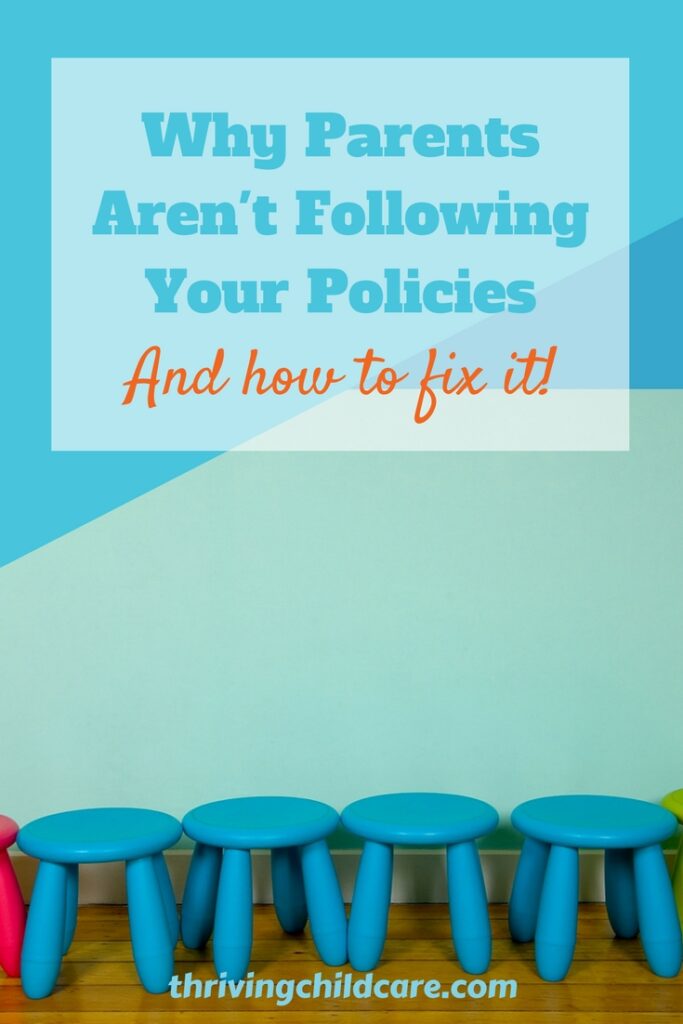Do you find that parents aren’t following your childcare policies? Just like any other business if clients have a habit of abusing your policies this can cause all kinds of problems. So let’s deal with it today. Let’s see why this might be happening and get some concrete steps to fix it.
Why Parents Aren’t Following Your Policies
Ok, I have a confession to make; I am actually a recovering nonaggressor.
What’s that?
Well in my book it’s someone who actively avoids confrontations. I may not seem like it to you, but it is true. The reason I might not seem that way, at least not anymore, is that I have trained myself to deal with situations as opposed to letting situations deal with me. In other words, I hit problems head-on instead of having to recover from them.
I say all this to say that even though I still do not enjoy confrontations, I have realized that not all confrontations are necessary to avoid.
In business, many interactions do not necessarily need to turn into a confrontation. I talk more about that here where I get into how to develop a habit of effective communication as opposed to those uncomfortable confrontations.
Today I really want to get into why we as providers have issues with parents not following our childcare policies. In particular, what we can do (or stop doing) to get your clients to respect your business procedures and you!
Seven Reasons Why Parents Aren’t Following Your Childcare Policies
First, let’s talk about why your policies are not being followed. See if any of these 7 rings true for your business:
- Understanding it’s a business – So it might seem like I am referring to your clients here, but actually, the provider could also be the offender here. I just can’t stress enough how important it is to acknowledge and understand that you are actually running a business. Yes, it may be out of your home, but it is still a business.
- You’re not enforcing your policies – This one is a biggie! We simply cannot expect clients to follow our policies if we are the biggest offender. Be the first one to follow your own policies. Sound simple right? Good!
- Your policies are not clear – Sometimes a policy is not defined enough and doesn’t really fix or avoid a problem. It might be necessary to review and revise.
- You make too many exceptions – If you make exceptions all the time, the exception winds up being the rule.
- Casual relationships – I think because we provide such a personal service, it is so easy for us to get extra-personal with our particular clientele. But maybe it’s too casual for a business relationship.
- Fear of losing clients – As most small businesses, we rely heavily on our clients for our very livelihood. Sometimes, that can cause a fear that if we lose a client we will be losing money. This may cause us to bend our rules too much.
- No key policies – I will admit, many providers do not see the need for policies or even a contract until a problem presents. Unfortunately, I have yet to hear of a situation where it didn’t present.
How To Get Parents To Pay On-Time EVERY WEEK!
Did you find any areas that might be a problem? Well, here’s the good news. All of that can be fixed. So now, let’s see just how can we fix it?
Seven Ways to Fix It
- Contract – I start with this because it simply is the best way to avoid many issues with clients even before they arise. Really, you simply MUST HAVE a contract. The even better news is this one is the easiest one to fix. Simply download a sample contract and revise it to fit your business needs. Over time (maybe even annually) you should make it a habit to review and refine your contract.
- Reminders – It took me a long time to realize that by sending out simple reminders about my policies and procedures or even upcoming holidays, could greatly increase compliance with my clients. As I have said before, I would rather do a little more work to avoid a lot more confusion.
- Knowing when to say NO – As hard as it might be to admit, not every client is a good fit for your business. That’s simply a fact! If it don’t fit don’t force it. We have to learn not to be afraid to say NO. NO to longer hours, NO to late tuition, NO to sick children, etc. There simply are some NO’s in business. Learning how to address these in a positive manner might be a bit tough, but it is actually more proactive than saying yes when you should have said NO.
- You are the professional – Something I think many providers (including myself back in the day) struggle with is actually seeing ourselves as a professional. There is something about working at home that seems to lack the business credibility that exists in the corporate world. Nevertheless, we simply must realize that we are our businesses’ first line of defense. The “P” not only stands for provider but also stands for professional as well.
- Consistency – Just like we advise parents that consistency is one of the keys to good parenting, consistency is a proactive habit in our businesses as well. Being consistent will help you to enforce your policies so that you gain more confidence in seeing yourself as the professional I spoke about above.
- Put it in writing – I am sure you can tell by now that it’s not just enough to just have a contract or policies, you also need to get your clients to recognize them. I mean you wouldn’t just have a contract and not provide your clients with a copy, would you? Having a Parent/Provider handbook is another effective way of communicating with your clients. I have even gone the extra mile and downloaded my handbook to my website. You know, just in case someone forgets.
- Procedure for change – Even if you have policies as I said before, sometimes things might need tweaking. At times you may need to make changes or create new policies. Think about creating a memo, email or text template for getting out the message that a policy is about to change. Of course, make the corresponding change in your contract and handbook. Remember consistency, consistency, consistency!
Time for a Change?
So did you find any areas that you think you might need to make a change? If the answer is yes, remember that’s fine. It’s your business and it should work for you and not just your clients. Making changes is a proactive way of avoiding the dreaded Burn-Out.
Related Reading:
- Must Haves for the child care provider
- Things I Added to My Contract
- How to make policy changes
- Little Backbone Book













